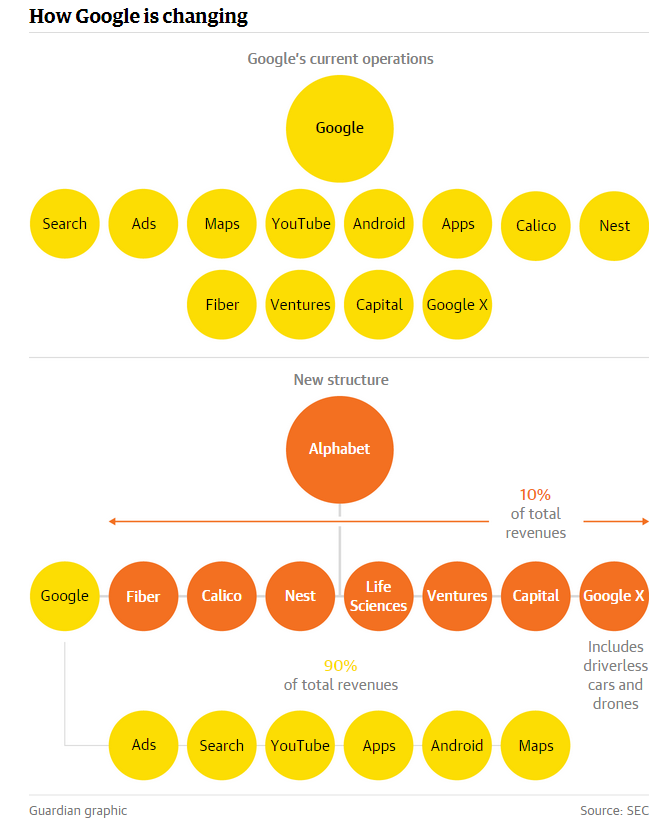Alphabet, The New Google. What you need to know.
We put together some of the ABCs on Google’s reorganization under the name Alphabet. Plus, our take on the reorganization and how it will impact our systems.
- Annual — Are they going to be reorganizing every year? This makes 2 in a row.
- Bet — The reorg will help Alphabet make more effective bets on new technology
- Calico - a new business unit studying longevity
- Don’t Be Evil - part of Google’s code of conduct
- Evolution — This strategy will keep Alphabet relevant into the distant future.
- Fiber — one of the eight independent units of Alphabet.
- GOOG & GOOGL, the stock symbols that will remain after the merger
- Holding company - what Alphabet Inc. will become.
- Innovation: It will be easier for Alphabet to innovate as a result of this restructuring
- J & K — Just Kidding. Who didn’t think this was a prank when it was announced on Monday, August 10th?
- Larry Page, co-founder and CEO of Google will assume the new CEO role of Alphabet Inc.
- Merger, the event that will take place where by Google will be a direct, wholly owned subsidiary of Alphabet Inc.
- Nest, originally acquired by Google in 2014, will become a direct subsidiary of Alphabet Inc.
- Original Idea? Not so much. Think Berkshire Hathaway. Warren Buffett is a role model for Larry Page
- Pichai, Sundar - the new CEO of Google
- Q4 2015, the first quarter Alphabet Inc. will report earnings.
- Reporting units — Alphabet will report financials on each of its business units. So, although our clients use consolidated financials, you can download more complete results from Alphabet’s own investor relations site.
- Subsidiary — What the Google search business will become
- The merger date has not yet been announced but will probably occur in Q4 2015 (see Q)
- Ubiquitous — They’re already in our eyes, on our phone, and controlling our A/C. New units will soon be driving our cars and helping us live longer.
- Ventures and Capital, new investment businesses as part of Alphabet Inc.
- Wojcicki — CEO of YouTube whose garage was Google’s first workspace
- .XYZ — The suffix made popular by Alphabet’s url ABC.XYZ
What does this mean to Markit On Demand and our clients? From an investor perspective, not much. The ticker symbols will remain GOOG and GOOGL. WSODIssues and XIDs in our XREF system will remain unchanged. We expect the data to simply flow through from our data providers, albeit under a new name. The reorg is technically a merger and we haven’t received any information from our data providers as to how that will be handled, but our Data Solutions team believes it could simply show up as a stock split or stock dividend with a 1:1 ratio. At this time, we don’t know the date of the merger, although Alphabet has announced that Q4 2015 will be the initial earnings results for the new company.
Why is Google doing this? Larry Page writes that Google is not a conventional company. What Google is, however, is a company with nearly $70b in cash/marketable securities and they’re looking for ways to deploy it to generate returns and, in their words, improve the lives of as many people as possible.
How does the reorg make that possible?
- It removes some of the legal risk of younger, speculative businesses from impacting core businesses. For example, if driverless cars go rogue, the liability will remain with Google X and shouldn’t impact the Search business.
- It brings in new management blood. Sundar Pichai will take over as CEO of Google. Other units will have their own CEOs. The founder of Nest, for example, has run the company he founded independently.
- Most importantly, it makes innovation more likely. In The Innovator’s Dilemma, Clayton Christensen says that large companies often fail because they are unable to justify the resources allocated to smaller projects, even when those projects represent the next generation leaders of an industry. He recommends carving new ideas out into their own business units so that they don’t compete for resources with the larger, more mature businesses. This is exactly what Google/Alphabet is doing.
The Guardian has a nice graphic comparing Google’s current operations to Alphabet’s new structure

